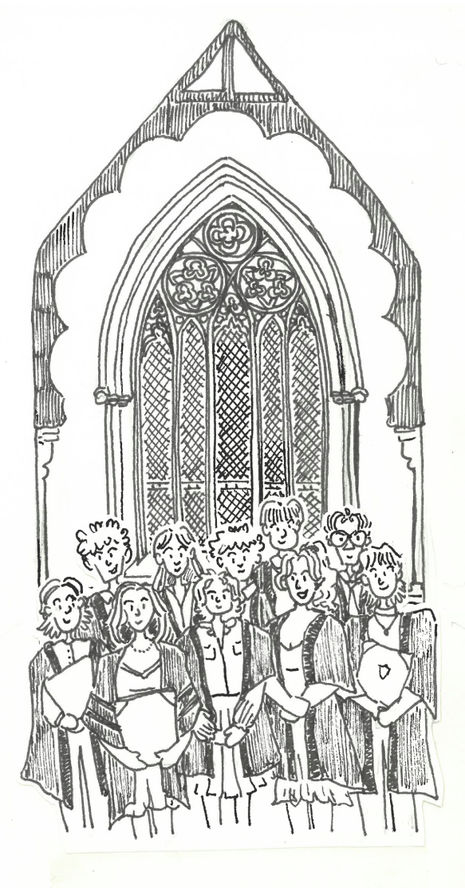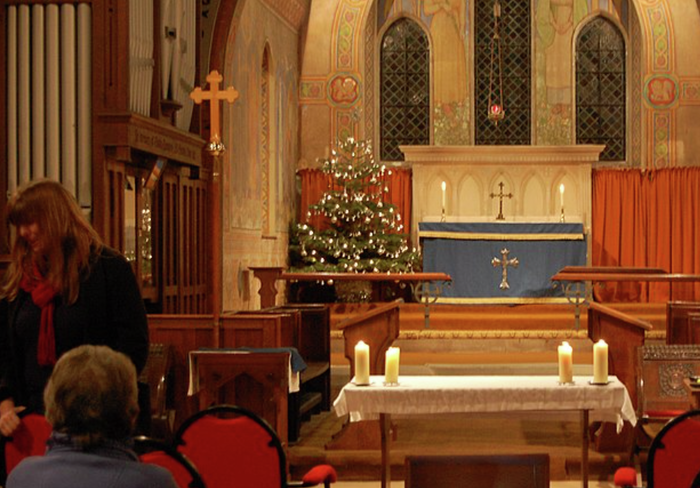College Choirs are seriously underrated
College chapel choirs are not archaic anachronisms, but offer valuable services, argues Omar Burhanuddin

How often do you listen to your college’s choir? If, like most students, you rarely set foot into your college chapel, the answer will be never. This isn’t particularly surprising: it is fairly easy to be cynical about the topic. Their service schedules are typically unnecessarily packed, and so rows of empty pews are, regrettably, to be expected. Religiosity is on the decline in Cambridge, and as our student body pleasingly diversifies to represent a greater number of nationalities and faiths, college choirs might seem to have lost their place in the ranking of Oxbridge institutions.
Admittedly, it is also easy to feel intimidated by them. College choirs openly perpetuate a lot of the stereotypes associated with Cambridge. Whilst most people will wear their gowns a few times a term for formals, choir members are demanded to don their robes several times a week. The services themselves, with painstakingly choreographed ritual and recitations of unintelligible Latin, often feel overwhelmingly grandiose, even by the standards of this city.
“College chapel choirs offer a great public service”
What, then, should we make of college choirs? Are they simply a hopeless anachronism, harking back to an era when colleges were founded, as mine was, for the pursuit not merely of ’education, research and learning’, but also ’religion’? What do they have to offer, beyond praying and preaching primarily to themselves, swanning about in their own self-satisfaction? Actually a number of things, I would argue. Although I am irreligious, I believe that college chapel choirs offer a great public service, not merely to the university but to the people of Cambridge more widely.
College choirs are wonderfully inclusive, participatory groups. Though some choirs are restricted to choral scholars alone, many others are open to all students. Before coming to Cambridge, I had never sung before, neither solo nor in a choir (I was that edgy kid who mouthed the words during hymns in school assemblies). But despite my inexperience, I was accepted as a bass into my college choir with nothing more than a friendly, casual audition. I’ve since had the chance to learn from more experienced members, and improve technically through the free singing lessons provided to all members. College choirs naturally platform talent, but they also train and develop newbies like me.
Beyond perfecting your vocal abilities, joining your college choir is also a richly rewarding, communal experience. Sponsoring choral activities is one of the many ways colleges support their students, with benefits ranging from free formals to heavily subsidised tours, both nationally and internationally.
All of this fosters a great sense of community across subject and year group divisions. That cohesion is something I think should not be taken for granted in Cambridge student life. Societies, whether college- or university-wide, are often run on a shoestring. With most being entirely student-run on rapidly rotating committees, it is difficult for experience and expertise to transfer. Consequently there is a lot of inefficiency and lethargy involved (think slow communications, strange lulls of inactivity, and poorly organised events), with many societies ending up as revolving doors for disillusioned students. By contrast, choirs – typically under the professional guidance of a dedicated director of music, and supported financially by their college – are well-oiled machines primed for the long run, practically guaranteeing you a positive, engaging experience.
“We overlook many of the truly unique privileges Cambridge affords us at no extra cost”
Finally, it is worth taking a step back, and reflecting on what a stunning privilege it is to have the chance to access such amazing music for free. Being able to listen to the King’s Voices – truly the Led Zeppelin of choral music – in the sublime acoustics of that college’s chapel is a globally unparalleled opportunity. Meanwhile, no less a reviewer than the New York Times has rhapsodised on the sonically ‘heavenly’ experience of attending a concert performed by Trinity College’s choir. All choral (and other!) concerts are listed on this glorious website, allowing you to easily plan time off to see your favourite performers. Other universities – including, for example, wealthy Ivy League schools – will often only subsidise student access to the arts. Even in Cambridge, for most orchestral, dramatic and sporting performances, spectatorship comes at a premium. But in the religious setting of a chapel choir service, where the music is intended as a public and spiritual benefit, everything is open access. The fact that Cambridge choral singers are not paid, despite spending inordinate amounts of time on private practice, rehearsals and services, only heightens the privilege of listening to them. A privilege provided not only to members of our university, but to all inhabitants of this city.
Students habitually moan about things. This is frequently justified. This can mean, however, that we overlook many of the truly unique privileges that Cambridge affords us at no extra cost. Appreciating your college chapel choir – recognising the services they provide, and revelling in the joys they bring - is one small way of regaining perspective. Even if singing really isn’t your thing, consider showing up to a service sometime. Although you may not understand the Latin bits (and most of us singers don’t either), you might just enjoy it.
 Arts / Why is everybody naked?24 October 2025
Arts / Why is everybody naked?24 October 2025 News / Cambridge don appointed Reform adviser23 October 2025
News / Cambridge don appointed Reform adviser23 October 2025 News / Climate and pro-Palestine activists protest at engineering careers fair25 October 2025
News / Climate and pro-Palestine activists protest at engineering careers fair25 October 2025 Comment / On overcoming the freshers’ curse22 October 2025
Comment / On overcoming the freshers’ curse22 October 2025 Arts / Why Cambridge’s architecture never lives up to the ‘dark academia’ dream 17 October 2025
Arts / Why Cambridge’s architecture never lives up to the ‘dark academia’ dream 17 October 2025









